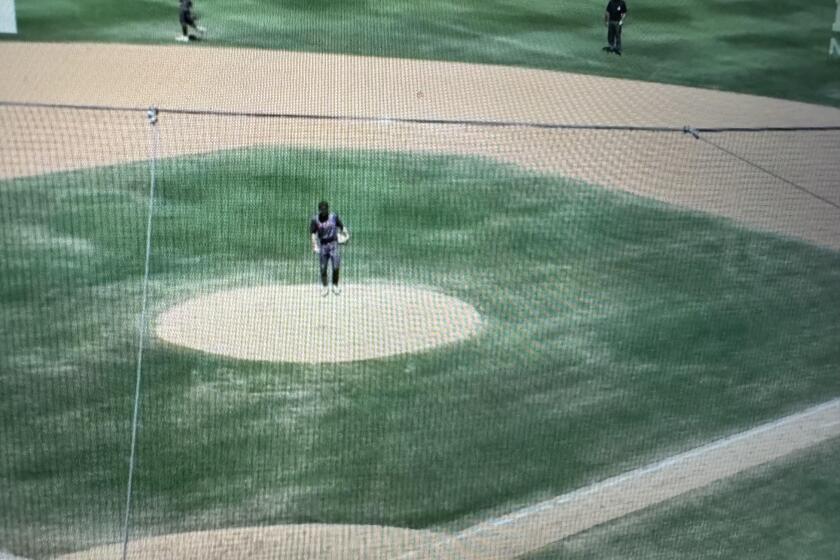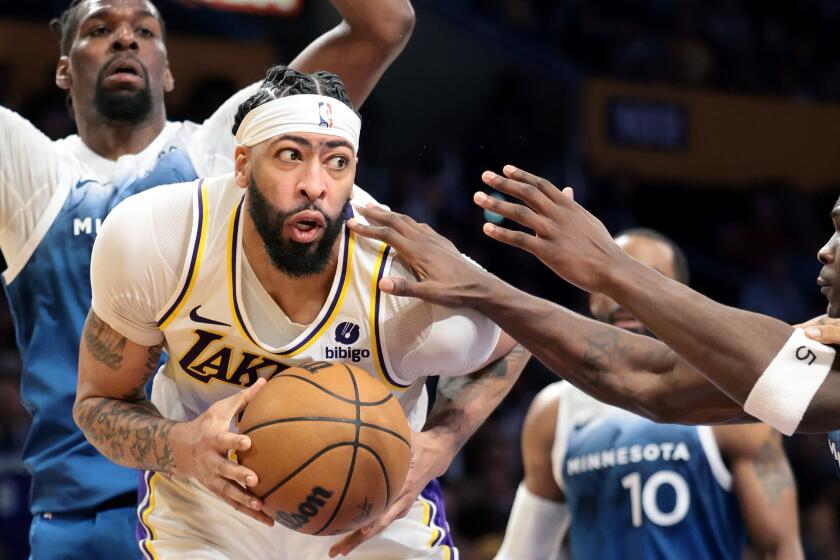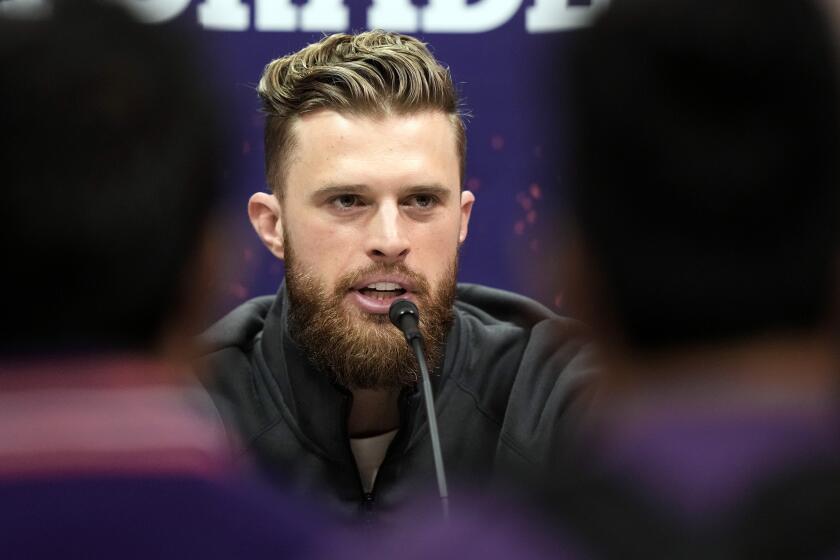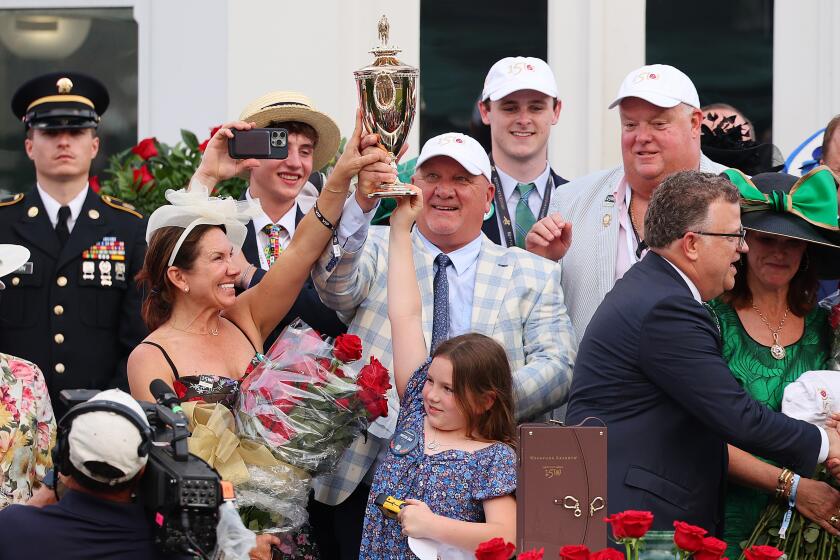BASEBALL / ROSS NEWHAN : Big Names to Take Their Cuts in ’95
Salary cap or not, major league owners are squeezing the players financially. Call it checkbook diplomacy--except that there is nothing very diplomatic about it.
Clubs are trying to reduce their player payrolls by 20% or more while flooding the free-agent market and avoiding arbitration.
“You can’t sustain this type of financial impact and not have it result in a major impact on payroll,” Dodger Executive Vice President Fred Claire said, echoing what owners’ negotiator Richard Ravitch has been saying throughout the sporadic bargaining negotiations.
In other words:
The system under which the players will or will not play in 1995 has yet to be determined, but the reaction to the economic impact of the strike and the anticipated impact on 1995 sales will go beyond a reduction of front-office and scouting staffs, reaching the dugout.
The fact that clubs have already guaranteed $540 million to 168 players in 1995 as part of previously signed multiyear contracts plays into it, reducing financial flexibility. Only seven of the 28 clubs start the signing season with salary guarantees under $10 million.
The San Francisco Giants, for example, have guaranteed more than $20 million to Barry Bonds, Matt Williams, Mark Portugal and Robby Thompson. The Houston Astros have committed $21.95 million to five players; the Texas Rangers $15.85 million to three; the Toronto Blue Jays $32.3 million to seven.
“You’re going to see more rookies and younger players in 1995 than ever before,” Ravitch predicts, adding as part of his salary-cap sales pitch that he doesn’t see how the union can continue to favor a system in which only 10% of the players receive more than 50% of the compensation.
The Dodgers, thanks to the rebirth of their farm system, had already resumed growing their own players and are continuing that process.
“It’s not the driving force in our decision-making process, but you can’t look at this situation and not have the budget be a factor,” Claire said. “Our payroll will drop significantly.”
It was $37.1 million last year. The club could shed $10.55 million in 1994 salaries if none of seven free agents are re-signed.
Cory Snyder, Roger McDowell and Jim Gott definitely appear gone, taking $4.55 million in salary. Kevin Gross, who became a free agent again when the Dodgers refused to offer arbitration as part of the repeater-rights process, may be re-signed, but not at his $2.7-million salary of 1994.
Center fielder Brett Butler, $3.5 million, and third baseman Tim Wallach, $3.3 million, are likely to return as insurance if Roger Cedeno and Ron Coomer are not ready--”We’re going to be making important evaluations all winter,” Claire said in reference to the winter leagues--but that will also depend on the price of the Butler and Wallach premiums. There may be too much emotion and, yes, loyalty, involved to let Orel Hershiser leave, but loyalty might not translate to his $3-million salary of ’94.
“We’re fortunate to have so many young players arrive at the same time,” Claire said. “We’ve never had this much quality young talent.”
Not every club can make that boast, but most are pursuing that approach.
There were 45 veteran players--Gross being an example--who lacked the five years necessary to repeat as free agents but could do so if their clubs failed to offer arbitration by midnight Wednesday. Only two--Chili Davis of the Angels and Darryl Strawberry of the San Francisco Giants--were retained by the offer of arbitration. Some will be re-signed by their previous clubs, but at lower salaries than they were making and without the divisive and inflationary arbitration process.
And many will not be re-signed.
Among several illustrations is what could be a loyalty lesson for Hershiser. The Atlanta Braves uprooted third baseman Terry Pendleton, their cornerstone of the ‘90s, and will replace him with Chipper Jones or Jose Oliva yielding a projected payroll cut of more than $3 million.
Similarly, there are very few options being exercised. The Oakland A’s, for example, refused to pick up the 1995 option on relief ace Dennis Eckersley at $4 million and will try to re-sign him as a free agent for considerably less. The Philadelphia Phillies refused to pick up options on reliever Doug Jones at $3.25 million or Pete Incaviglia at $1.2 million.
There may be as many as 200 free agents diluting the market. A few, such as Bill Swift, John Franco, Gregg Jefferies and Larry Walker, should do well. So will Jack McDowell and Jim Abbott, providing the dispute over service time during the strike is resolved in their favor and they are ruled eligible for free agency.
Otherwise, many name players are likely to come up empty.
How ironic. As the owners continue to pursue a salary cap and new compensation system, they are now underscoring what the players have always tried to tell them: A free market will always react to economic conditions and adjust itself. Particularly when sound financial policy and good management are used.
AFFIRMATIVE ACTION?
You may need a program to identify baseball’s new managers and general managers, but you won’t need a color chart.
They’re all white.
Eight years after the Al Campanis incident generated a commitment to minority hiring, no minority holds the position of president or CEO and only one serves as a general manager--Bob Watson of Houston.
There are four minority managers--Montreal’s Felipe Alou, San Francisco’s Dusty Baker, Colorado’s Don Baylor and Toronto’s Cito Gaston--but what there is of a commitment has largely been delivered at the administrative or non-decision-making level.
Consider the last three months:
--The St. Louis Cardinals and Chicago Cubs hired new presidents--Mark Lamping and Andy MacPhail, respectively.
--The Minnesota Twins promoted personnel director Terry Ryan to replace MacPhail as general manager; MacPhail hired New York Met vice president Ed Lynch to replace Larry Himes as the Cubs’ general manager; Lamping hired Colorado assistant general manager Walt Jocketty to replace the fired Dal Maxvill as Cardinal general manager; the Texas Rangers fired Tom Grieve as general manager and hired Baltimore’s personnel director, Doug Melvin, and the Blue Jays promoted assistant general manager Gord Ash to replace retiring Pat Gillick.
--The Kansas City Royals fired manager Hal McRae (who became the Cincinnati Reds’ hitting coach) and hired Cincinnati coach Bob Boone; the Orioles fired Johnny Oates and hired Cleveland pitching coach Phil Regan; the Rangers fired Kevin Kennedy and hired Oates; the Boston Red Sox fired Butch Hobson and hired Kennedy; the Cubs fired Tom Trebelhorn and hired San Diego manager Jim Riggleman, leaving the Padres to hire third base coach Bruce Bochy.
That’s a total of 13 key positions filled. And although there is no disputing the credentials of any of the new general managers, or the loudly applauded appointment of the respected MacPhail to provide the Cubs with some long-absent stability and leadership, or the managerial potential of Regan and Boone at a time when the Red Sox and Rangers couldn’t wait to recycle Kennedy and Oates, the absence of a minority in all of it is glaringly conspicuous.
“It only illustrates again that we have to have more people in the pipeline so that there’s a natural progression when the opportunities come up,” acting Commissioner Bud Selig said.
Selig discussed the situation with league presidents Leonard Coleman and Gene Budig in Milwaukee on Monday.
“I’m convinced that the clubs are sensitive to the issue and conscientious about it,” he said. “Our overall (minority employment) percentages have continued to go up. Our last grade from Richard Lapchick (a Northeastern University sociologist who rates various industries on their minority hiring) was a B.
“At this point, we still have to do a better job of identifying people and getting them in the pipeline, as Bob Watson was. Do we have a ways to go? Yes. Will we get there? Yes.”
At the pace of the last three months? Never.
More to Read
Get our high school sports newsletter
Prep Rally is devoted to the SoCal high school sports experience, bringing you scores, stories and a behind-the-scenes look at what makes prep sports so popular.
You may occasionally receive promotional content from the Los Angeles Times.






